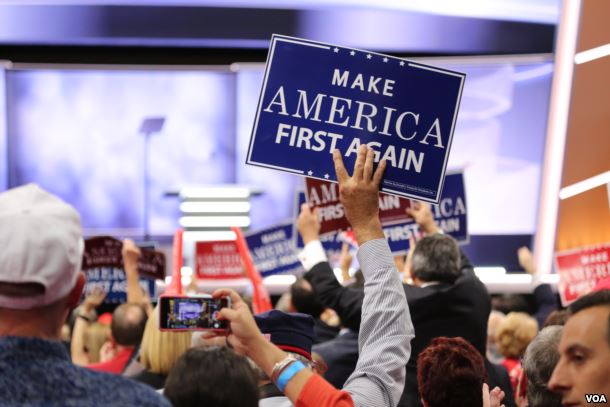Trump’s policy is a top-down nationalism for America’s rich, when what we need—both here and abroad—is an internationalism from below.
Published in the March 2018 issue of the New Internationalist.
For workers at Carrier, an air conditioning and furnace manufacturer in Indianapolis, the beginning of 2018 meant more lost jobs. Some 215 employees finished their last shifts shortly after the Christmas holidays. Their work was moving to Mexico.
Just over a year ago, newly elected Donald Trump thrust Carrier into the headlines. The company had planned to relocate some 2,000 jobs from Indiana to the Global South. But Trump announced that he reached a deal with Carrier to keep the work stateside. He proudly told employees that companies “are not going to leave the US anymore without consequences.”
The Carrier agreement was meant to solidify Trump’s populist credentials and demonstrate that he could bargain tough deals with wayward businesses. Under an “America First” trade policy, Trump has promised to bring manufacturing back to the US.
In reality, however, his administration has shown little willingness to rein in business abuses. Trump’s policy could more aptly be called “Corporate America First.” It is a top-down nationalism for America’s rich, when what we need—both here and abroad—is an internationalism from below.
One problem is that White House actions have been all carrot and no stick.
On the campaign trail, Trump talked of imposing stiff penalties on companies that moved overseas in search of inexpensive labour. Instead, his administration has offered handouts to corporations, ostensibly to preserve jobs.
At Carrier, Trump’s deal involved giving the company some $7 million in state tax breaks and incentives in exchange for outsourcing only half the work. Additionally, Carrier’s parent company, United Technologies, continued receiving lucrative federal contracts.
In short, by dangling the prospect of expatriating its factories, the company scored big. Trump was not getting tough, but rather capitulating to a threat.
“He pulled a bait-and-switch on us,” said one of the now-jobless workers.
The recently passed Republican tax bill, which conservatives touted as a means of boosting manufacturing and making US business more “competitive”, provides a similar example. At a time of record profits, conservatives are cutting the corporate tax rate by 40 per cent—a giveaway worth hundreds of billions of dollars. But numerous economists, both Left and Right, have argued that by watering down tax requirements on profits made internationally, the bill actually increases incentives to outsource.
Aside from such policy failings, Trump’s “America First” focus on manufacturing misses a key point: there is nothing inherently noble about forging steel or being part of a factory assembly line. A century ago, this work was unduly dangerous and highly exploitative. What turned manufacturing jobs into good jobs was people standing up, joining unions, demanding better conditions and winning—against the desires of bosses no less greedy than current corporate executives—a greater share of the profit of their labour.
Today, we need not reverse the trend of service sector jobs replacing manufacturing jobs in the US economy. But we must make sure that all work affords a dignified standard of living.
In trade agreements, this means upholding the right to organize as a human right. And it means ensuring that a business’s “comparative advantage” is not based on finding factory sites where it can pay poverty wages or wantonly poison the earth. In other words, it involves a vision of solidarity that extends concern across borders and recognizes the harm of all exploitation, wherever it occurs.
In the US, it means insisting that janitors, hotel housekeepers, nursing aides and retail staff are no less entitled to just conditions of employment than were past generations of unionized factory workers—those whose jobs are growing increasingly scarce. Of course, this stance requires more than offering “incentives” to already flush CEOs. It entails supporting popular efforts to take power away from corporate elites and put it in the hands of working people.
Despite all his nationalist rhetoric and faux-populist pronouncements, that’s something Trump will never do.
__________
Photo credit: Voice of America / Wikimedia Commons.
